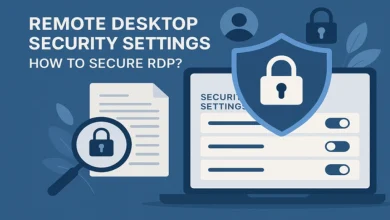Don’t Let Cyberthreats Take Down Your Small Business

In the world of cybercrime, small businesses quickly became easy and desirable targets. Why? Usually, small businesses lack essential cybersecurity knowledge or professional tools to protect themselves. Most small business owners can’t afford a dedicated cyber-safety team, either. So, they quickly become open to cyber-attacks.
Are you also afraid of cyber threats and want to protect your business? You are here at the right place.
This comprehensive guide explains the most common cyberthreats and how to protect your sensitive information from them.
Keep reading to protect your company on the way to success!
<mark style="background-color:rgba(0, 0, 0, 0);color:#0061fb" class="has-inline-color">Common Types of Cyberthreats</mark>
1- Malware and Ransomware
Statistics show that 46% of all cyber-attacks happen to small businesses with fewer than 1,000 employees. Malware and ransomware are used the most — at a total of 18%. But what is malware and ransomware?
Malware, short for malicious software, is any code that targets different types of systems, like computers and smartphones, to steal data or damage the system or network that carries said data. Ransomware is even scarier: it doesn’t just steal data but rather holds it hostage. To get it back, the owner has to pay ransom. If they refuse, the data is spread around cybercriminal forums.
Malware and ransomware can be caught through unsecured websites, spam emails, and infected hardware. Small businesses often don’t invest in backup options, making them easy targets for these tactics.

Protecting Your Business From Malware and Ransomware
Thankfully, some simple tools help small business owners protect their data. First, look into cloud-based DNS filtering solutions and endpoint protection. The latter usually addresses ransomware-related issues and can help restore devices in the event of an attack.
Secondly, advocate using a reliable Virtual Private Network (VPN) for all your employees. Steer clear from free VPNs as they are infamous for making money off of your privacy, which is why they are free. Try to go with the best VPN for your business needs.
You can use this software because it lets your team access cloud services securely and protects all sensitive data from unauthorized access. VPNs for Linux, Mac, and Windows devices are generally readily available on the market. Multifactor authentication is also a great idea, as it will prevent cybercriminals from accessing business information.
2- Phishing
During phishing attacks, criminals pose as reputable organizations, such as your bank or a company employee, in hopes of stealing sensitive information. These attacks happen through emails or text messages that closely resemble reputable ones. In 2024, some of them will be impossible to spot in other business emails.
Unfortunately, small businesses receive the most phishing correspondence, one in 323, and will give up credit card details, passwords, and personal information in seconds. This most commonly results in huge financial losses.
Protecting Your Business From Phishing Attacks
Phishing is a dangerous form of cyberthreats because it plays on human emotions and fears. Emails with fraudulent messages usually convey that you absolutely have to update your information or transfer a certain amount of money to the sender. Otherwise, you will face terrible consequences. That’s exactly why training your employees to spot phishing is important. The best approach is to try simulation tools to teach your team how to check the message’s authenticity.
Additionally, a good email security gateway or cloud-integrated email security (ICES) tool can prevent phishing emails from reaching your employees’ inboxes. If they do, these tools usually display banners warning about the suspicious content. Multi-factor authentication that uses passkeys instead of passwords will also strengthen the system.
3- Data Breaches
A data breach can be one or several cyber attacks combined. It happens when a criminal gains unauthorized access to your business information through cloud services, computers, or databases. Then, they steal information like financial data and business property to use for malicious purposes.
A data breach can cause financial losses, legal issues, and damage to your business reputation. Cyber-attack and data breach are two terms that mean similar things, but a data breach is focused solely on stealing data.
Protecting Your Business From Data Breaches
To protect your small business’s privacy, create an incident response plan. What will your team do in case of a data breach? Come up with comprehensive steps that will guide your employees if that happens to minimize losses and stop the criminal in their tracks.
Make sure everyone goes through verification before they access their accounts and business data. That includes:
- passwords,
- passkeys,
- two-factor authentication or multifactor authentication,
- Biometrics.
Encrypt all sensitive information. Even if the criminal gets their hands on it, they won’t be able to exploit it. Research high-quality data removal services like Incogni that you can use to dispose of any sensitive information tied to your business. Thanks to these services, you can safely hide the data from cyber thieves.
4- Poor Password Policy
After everything we have already discussed, it’s clear that a lot of criminals prey on small businesses with weak security protection. Sometimes, the reason for being attacked is hidden in plain sight. Even obvious things like poor password policy can be blatantly ignored by the business owner and staff.
Yet, using weak passwords, reusing the same codes for multiple brand accounts, and skipping 2FA will grant a quick gateway to your sensitive data and listed in one of the common cyberthreats.
Protecting Your Business From Poor Password Policy
To strengthen your password policy, provide your employees with practical information about creating strong passwords. Let them know that they shouldn’t use their personal information like their name or birthday in the password. Every code should include lowercase and uppercase letters, numbers, and symbols.
If you can, invest in a business password manager. This technology will generate strong passwords for each business account and secure them in a cloud system. As a CEO, you will be able to manage and track password usage through this software.
For an additional layer of security, try FIDO2-based passkeys that replace passwords. Every time someone logs into an account, a new passkey is generated. You or any other responsible individual must authorize access to the chosen account.
<mark style="background-color:rgba(0, 0, 0, 0);color:#0061fb" class="has-inline-color">Protecting Your Small Business Is Worth It</mark>
Small businesses face many threats online. In fact, they are most often targeted by criminals. Thankfully, with respected tools and up-to-date knowledge, you can protect your brand from data theft. Make sure you have a comprehensive cybersecurity approach to protect against phishing, malware, and data breaches.




